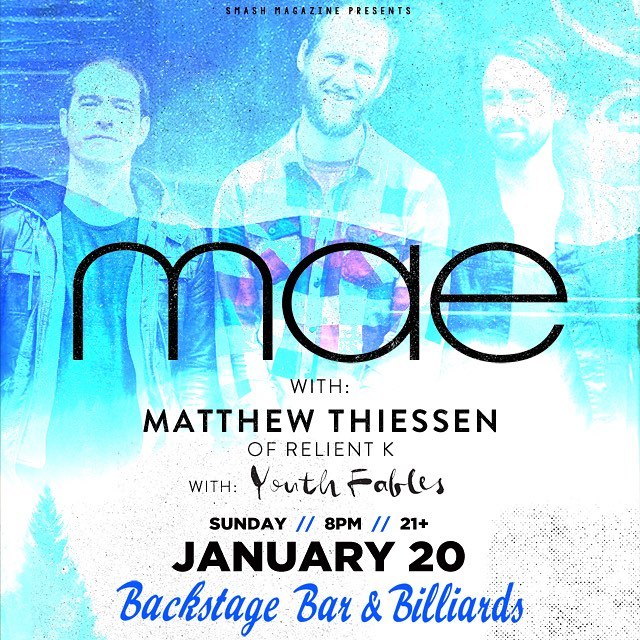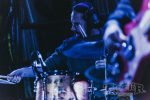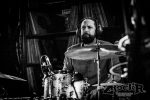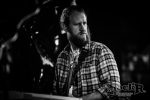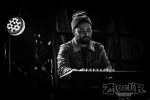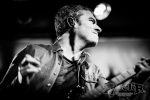After being gone for over a decade, MAE returned to Las Vegas and took over Backstage Bar & Billiards downtown to a pretty full house with Matthew Thiessen of Relient K as support.
Prior to the show, I had the good fortune of getting to sit down with Dave Elkins (lead vocals/guitar), Zach Gehring (guitar), and Jacob Marshall (drums). Also present was Jacob’s 8 year old adorable chihuahua Gogi. I just have to say, before I jump into the interview itself, it was an honor getting to sit down with these guys, and was arguably one of my favorite interviews in my 10+ years of doing what I do.
ZR: So, first off, when is the last time you guys played Vegas?
Elkins: It’s over a decade for sure. It’s so far away from today, that we don’t even remember.
Gehring: I feel like it was over at Jillian’s.
Marshall: There was also an outdoor one we played once. This little amphitheater thing…
ZR: Oh wow. So, how does it feel to be back?
Marshall: It’s awesome. We haven’t spent enough time here. We got in late so we are excited to hang out and take it in. Seeing the development in the Arts District is cool.
ZR: And you guys just put out a new album. How is that going?
Elkins: It’s going great. You don’t really know what to expect, I guess. I don’t. It’s been so many years since we put out an album, and the music industry has changed so much since we last put out music. So, any rules we would follow, any goals we’d hope to obtain; it’s all changed so much. Streaming wasn’t even a thing when we put out our last album.
Gehring: Things were changing before, but it wasn’t to this kind of digital distribution. It was file sharing and things like that.
Marshall: That No Man’s Land that existed in music helped us rethink how we thought of success. Instead of letting a number dictate success, there has been a different way to define that for ourselves. What it means to us in this point in our lives, and to have it come out and have people enjoy it and bring it into their lives is extremely meaningful. So, regardless of the business conditions, that is enough, to feel that sense of accomplishment. We took some steps into the directions, creatively, including things like virtual reality and presenting what a Multisensory Aesthetic Experience is. So, for us, I feel the goals are more creative. We have to build our own vision of success.
ZR: So, are you guys doing funding for the tour and albums yourselves, or do you still have that backing from a label?
Elkins: The label helped with making the record, but everything else is on us. If we are getting paid to be in Vegas, we would rather use that to cover our expenses as opposed to the label paying it and us having to give it back anyway.
ZR: It seems a lot of bands now-a-days are taking that approach of doing it on their own.
Gehring: Having a label support you as a band is a weird thing now. You have to ask what they are going to do. If they are going to lend us money that we are going to have to give back, that environment is not conducive to that arrangement, really. As a band, we do have a lot more access to certain platforms. It’s a lot more work, and there’s a learning curve for sure, but it’s more benefit. Bands are kind of seeing they can take things into their own hands. Crowd funding is a great example. Kickstarter, things like that. It’s a model that makes sense. So, bands have more opportunity, but with that model comes the curve to understand how things work.
ZR: So, as far as your music, because I know there was a bit of a hiatus before reforming, you guys have been around for quite some times (18 years), and I remember listening to you in highschool. How would you say your music, the way you write, your styles – Has that progression changed? Do you get into a room together?
Gehring: Well, one thing that has changed is we don’t live in the same states. So, that collective, creative experience is infrequent. For this record, I’m in Virginia, Dave is in Nashville, and Jacob’s in New York. So, we would find 3 or 4 days and fly out and go for it, take a break, and Dave owns the studio, so he’d work on fixing and arranging and placing. Then we’d come back. So, in one sense, creative moments are fragmented. So, there’s that, and it’s been a long time. So, creatively as individuals we’ve gone through different things. So, it’s trying to put together all these creative ambitions and desires while at the same time understanding that we aren’t together all the time anymore. So, for me, it’s a challenge, but in the end it’s a good thing. So, we’re together for a short time and then you’re [Dave] there, and the progress is not necessarily linear. So, as a producer, being between these times versus what we are to do next to get the songs done
Marshall: It’s a unique challenge, and Dave is wearing so many hats in this project. Producing, performing, writing, and we all have different strengths that come to the table at different times. I feel that in a lot of ways, this reflects the best of how we use those strengths collectively. The process was certainly different, but because it was the first record in Dave’s new studio, it felt closest to the first record we ever made. We were making that record before we ever played a show. Normally a band figures itself out through live performance, and then goes to do a record. We were fortunate to do it backwards and say, “How does the studio let us create what we want to hear?” and get it to a point where it was ready to present to the public and perform it. When we made that record, our long time bass player, Mark, engineered it and was gracious enough to give us free studio time whenever he had down time. He just wanted to get better at his craft too. So, it was a sound laboratory for like a year, to give us the freedom to not settle for something that was less than what we wanted. It felt like, with this record, it lived outside of the boundaries. We were working consistently. From the time that the first song was written to the time it was recorded was such a process.
ZR: Sometimes though, it takes that time to get what’s in your head, out.
Marshall: Exactly. It takes time for the gestation and germination to come to fruition and you can’t force it. Sometimes you have to wait for it to show up, and when it shows up, you know it.
ZR: So, since you are in the producer role as well as being in the band, for you having to switch that hat and look at it from a standpoint of the business and not the musician, how is that for you? Is there ever an internal struggle at all?
Elkins: Yes. I think the role of a producer is to get a collective vision, a mission statement, from the artist or band, and then your role is to figure out how we are going to exceed those expectations. So, we want to keep it true to what the artist wants. Producers are like, agitators in good ways. It’s like, I know you can do better, but I want to host this environment that makes you safe and comfortable to go further. And that goes for the singer, the song-writer, drummer, guitarist, all of the above. At the same time, you are dealing with fragile, and at times, insecure egos. Creatives are very passionate, and on a moment’s notice not know what to do next. So, being both the artist that might do that and the producer that’s trying to stop that simultaneously, there were moments where I felt empowered and excited and determined, and then there were moments where I felt like I didn’t know what to do. As producer, it was my job to say, “Well, why don’t we just go in this direction. If your singer can’t sing today, there’s another drum track we can record.” I have a dry-erase board to establish and show progress, and it sat kind of in the same state for a really long time. So, I’d walk in the studio, and Jacob would be back in New York and Zach would be back in Virginia, and I would walk in and not know where to get started, even though I was seeing all of these fun colored boxes that still needed color. So, I would listen to the same song for an hour and attempt to write some lyrics. There’s that battle where you know it is unfinished, but you don’t know what’s next. So, as a producer, you’re supposed to bring this confidence that we are all going to get to where we believe we are supposed to go. So, it was never fake confidence, but at times there was a lack that I was expecting or hoping to have as a producer. I will tell you this, I’ve produced 3 or 4 different projects since we finished the album, and I walk into every production situation with self doubt. It’s not because I haven’t done it already. I think it’s just that creative thing where you can stand for something so whole-heartedly but not it’s not even finished. It’s like… “I know this song will be awesome!” and someone will ask what it sounds like and I’m just like, “Well… I can’t show you just yet.” There were moments like that where I needed to trust in my connection with everybody involved and then also just be a bandmate sometimes. Sometimes I had to be producer but trust my assistant and be like, “I’m going to sing today and as producer I’ll produce my vocal, but I am asking you to tell me if there’s something weird you’re hearing based off what you’ve been hearing me tell everybody else when you’ve been in the room.” So, I was always putting on a new hat, and sometimes I had every hat on and looked silly.
ZR: So, it’s having that control and needing that control, but also knowing when to give it up.
Elkins: Exactly. Producers in my opinion are best when they are almost the fly on the wall that kind of breathes ideas instead of yells them. So, if people are looking for the producers to come up with the ideas, that’s not going to go very far because the producer is hoping that the artist will come up with ideas and then as a result, the producer will find those ideas and push them further. It was such a wonderful experience because I got to move in to the studio and we used the studio literally as an instrument where Jacob would, when we were looking for drum ideas and using something other than a drumset, stand and bang on the wall with sticks. We’d do stuff like that with the interest of full experimentation, and most everything we experimented with we ended up keeping, and that’s because we’re older. If we would’ve been experimenting as20 year old kids like we did on our first album, we wouldn’t have had the experience and the knowledge to take risks. On the song “Let it Die” we were wanting synthetic drum ideas and drum sounds, but we didn’t want to just go grab samples somewhere. We had soft drum cases, and Jacob was banging on those. So, if you listen to the intro to “Let it Die” you’d be like “Oh, that’s a cool electronic drum sound. Where’d that come from?” and it’s actually real sticks hitting something you wouldn’t expect sticks to it, and we manipulated the microphone with distortion and things like that to get what we got. So, one of the things I’m super proud of is that every sound that we made came from ourselves. We weren’t grabbing samples. It was organic as anything we’ve ever created, which is I think what we were setting out to do, but we accomplished it either way. You don’t walk into the studio and go, “Today at 10:15 I’m going to ask Jacob to bang on the wall with his drumsticks.” There’s no bang on the walls box that I can color in. So, a lot of stuff that made it on to the album did not necessarily get a box to color in, but it’s a special ingredient on the record. Time was on our side and we had the ability to work at a pace where we just wanted to accomplish what WE wanted to accomplish with our album. We weren’t going to waste time, but we also weren’t going to settle. So, I think that if we made another record soon, I’d definitely throw my name in the hat to produce it, and I would probably also if I did, would encourage us to spend a good amount of time in pre-production honing in on some of the things we want to accomplish. With the way we are spread apart, and the ideas where they were, had the album take longer, and Mae could’ve made the same album in a month and a half if we had just spent more time in preparation for the studio experience. But then again, we haven’t been in the studio together since 2010. We’ve had pockets of time, but for something legitimately worth making an LP we were going to need substantial time.
ZR: So, where do you go from here? Do you plan on another concept record or do you just want to get through everything now and chill for a bit?
Marshall: This is the most ambitious concept record I think we’ve done. There’s so much in there. It will take time not for only our fans to discover things on the record, but we’re discovering stuff still that shows up, and it’s like “Oh, wow”. We’ve been wanting to express the multi-sensory aesthetic experience side of the band since its inception. Recently, technology has created some ways for us to do that. So, we have a visual experience that we’ve been working on. It allows us to take those ways of expressing. Even the cover of the record is painted by a girl (Melissa McCracken) who has synesthesia. So, she experiences sounds and music as color in her brain, and has the capacity and gift as a painter to express it on the canvas, so the album artwork is literally the result of her being on calls with us, listening to demos, and being present during the process and absorbing the whole record and painting her experience from that. So, we were both excited to have a visual representation as color through paint, and then the virtual reality as visual realization of color and sounds as light and particle. Being able to expressed the different dimensions of our senses, we’ve worked with neuroscientists on vibrations and fragrances, so there’s a lot we are trying to express in this album. So, for those that want to have a casual listen, I think there’s a lot there that they can latch on to and enjoy. However, if you want to go deeper with it, it will reward you.
ZR: At what point did you guys sit there and go, “Yes. I want to create, and I want to incorporate everything.”? What made the sensory come into play?
Marshall: I would say that there are certain experiences you have emotionally, spiritually, phuysically that hold a space that is bigger than words. So, when you approach music, instead of trying to express that feeling in sound, it can actually find a vessel that is bigger to hold it. That’s why we feel goosebumps when we listen to a piece of music. We are receiving a communication that is beyond words. We have been moved in certain situations to the level where to express it can start with music, but there’s even more than that. So we want to actually reveal this connection in our body, the experiences in our brains, these different kind of sensories and explore that border land where one can become another. You know, if you’re at a show and see this amazing light show is extending the sound. So, you can feel it. At the same time, if someone did a terrible light show, you can feel that. So, inherent of how we experience the world is the possibility for harmony across the senses. So, that’s really what it’s about. It’s about finding the spaciousness and the container that holds the emotions, expression, and sound, and exploring how harmony can actually go beyond the sound and into the land of fragrance and tactile and exploring the way those things blend together to make music within the body.
ZR: Interesting. I don’t want to take up too much of your time, but was there, for each of you, any particular song or album in your youth that made you feel that whole body harmony? And what was it?
Elkins: Wow. I can remember going to the library and checking out The Beatles tapes. I’m dating myself, but oh well.
ZR: I have cassettes too it’s okay!
Elkins: Somehow cassette tapes are up twenty-something percent in sales from last year, and I’m just like “WHY? Who has a tape player and why?”
ZR: They’re making a comeback! It went from vinyl to tapes.
Elkins: They are going to get rid of smart phones and we’ll go back to cans and ropes again. Haha. The Beatles though, I remember the first time I heard the song “A Day In the Life”. I was just a kid, and that song meant so much to me over the years. In fact, I got to cover that song with Mae as an adult and record it and play it live. If you know that song, it’s like a psychedelic journey. It starts off with John singing, and it’s this ballad, and the symphony takes over and it just kind of covers the whole thing, and then Paul comes in and there’s an alarm clock and all these sounds and people playing and talking all over the record. I remember the first time I heard it I felt like I had a spiritual experience. I don’t know what it is. It was like if God’s self showed up through a breeze in the bus. Everyone felt it, but I didn’t know what to do with it. I’m not capable of meeting what just was offered to me. I’m going to have to stay here and wait for a while. I was like 9 or 10 years old, but I remember it so clearly because my mom would let me go to the library so I could check out music, and that was a moment I remember to this day. Sitting in my room, putting the tape in the boombox, and going “What was that?” It wasn’t until I met Jacob in college that he brought that idea to my brain so that I could understand. I’m sure we all have, hopefully we all have, those moment where music takes over and somehow the soundtrack, even though it didn’t know it would be the soundtrack, the words being sung… That’s my life! There’s been a moment where I’ve listened to music while driving in my car and right where the vocalist ends and the guitar has all the delay and reverb and bloom, and all these birds jumped out and flew across my path. I feel like they knew I was listening to this song.
Marshall: It’s all one symphony.
Elkins: These moments happen I think to a lot of us, and also every memory I have associated with my childhood has music associated with it as well. So, I just have countless moments of music blowing my mind and my senses. I’m sure you’ve gotten the goosebumps before from music, and how amazing is that? You can’t feel music. You can feel the vibration, but it’s not the vibration giving me goosebumps. It’s something spiritual. It’s something else. I’ve done it where I’ve been hot and sweaty in a venue, and people sing back to me, and I get goosebumps. This is something beyond. This is something so much more. We can’t conjure it up. We can do our best to stay true to the practice of our instruments and songwriting so we can be prepared when the time comes to answer the call, but I can’t say “I want to write a song that will make you have goosebumps”. I don’t know how to do that, yet somehow it happens. I feel like that’s the most multi-sensory I’ve experienced, is what The Beatles did to me and when time and again music that has found me has brought me to that place, or even some of the songs we’ve written ourselves have those moments, which is a gift.
Gehring: I was watching a documentary about Radiohead’s OK Computer and they talk about things and Jonny Greenwood’s solo is really loud and really kind of juxtaposed to the song itself. It’s harsh tones. The guy talking said he was trying to break the songs with his guitar solo. So, the songs that connect with me, is a weird thing where the song is the limitation. You’re doing your best with the art form you have, with the medium, but there’s something you can’t get to. The song is the closest you can get, but you are frustrated because the song can’t get you there. For me, Pearl Jam’s “Deep” from the Ten record, there’s something about what I interpret they are trying to get to, but they can’t get to it so the music itself is so much more intense. You hear it with Nirvana. It’s more aggressive music that I connect with in the general sense, but any song at any moment, any genre, can get to that point where you’re mad because you can’t get to where the song is wanting us to go. There’s a disconnect. So, for me it translates this idea where, if there is this larger truth, there’s a gap in our ability to access it. That frustration of not being able to access, or not being able to universally communicate to solve certain problems, this gap is where the aggression lives. Songs meet us where we are, and when someone’s reaction to a song is an insight into their life, because each song will meet us differently, it’s those moments that transcend. It’s the want to go somewhere where you can’t get. That’s why songs continue to be this motivating thing, because they are optimistic and keep trying. Songs keep being made. Books and poems keep being written. People keep doing this stuff because there’s something we’re not reaching. So, the only commonality we have here is that we can recognize that there’s something we’re not reaching.
ZR: I have never thought of it that way and now I’m sitting here like, oh man, yes!
Gehring: Exactly. So, for me, that aggression is one way I connect with people because frustration manifests in these types of songs.
ZR: I get that. I’m going through the songs in my head that are frustrating, and it’s almost heartbreaking in a way.
Gehring: Yeah! You try again and again and sometimes you listen to a song and nothing happens, but you listen again and there it is. We react situationaly, day to day. Some days the reaction is strong. The conduit is still blocked.
Marshall: My grandfather and grandmother were both classical musicians. So, some of my earliest memories were of just these beautiful symphonic, textural sounds. String orchestras, and this unique, unmistakable sound. For me, it was the tamber. When you hear a violin it hits a certain register physiologically. My dad was more into the rock ‘n roll ride of things, and I remember taking long drives and just play really loud music, but my most intense experience actually happened in silence. In silence sometimes you hear the space that holds potential for all other music. In particular, in certain levels of meditation, I’ll hear in the silence the possibility of music. That is actually really overwhelming, and it’s weird to frame it that way because it’s not the actual creation, it’s the possibility. That connects for me. You can’t ever quite express in a way that brings the biggest possible expression. Silence as a natural phenomenon is actually harder to find. I saw this amazing documentary about this guy who is basically on a hunt for places of natural silence, and he was talking about how every time you think you’re in silence, if you sit there long enough, you start to hear all of nature singing to you. There’s so much in what we perceive as silence, that it’s far from it. Listening to those moment of natural silence, to hear nature itself become a symphony; it’s profound. I think sometimes we get stuck in our own egos. We as a species are the only ones who can communicate to each other, it’s just humbling to hear the world singing if you stop long enough to hear it.
After the interview, I popped back in to Triple B’s to catch some of Matthew Thiessen’s set. Full disclosure, I was never a big Relient K fan. Aside from their song “Be My Escape”, I could not tell you what else they did, and honestly, I’ve only heard the acoustic version.
That being said, I was beyond impressed by Thiessen, and left the venue a fan of his music. I actually added his newest album Wind Up Bird to my Amazon playlist.
Thiessen stood solo on the stage, with nothing more than an acoustic guitar and a voice so powerful I think that if the mic had gone out, it wouldn’t have mattered. The songs that stood out most to me were “Man of Stone”, “Clean Sweep”, and an adorable little number about Robin Hood and Little John, “Forest”.
After hearing the passion behind these songs stripped down and acoustic, it is taking me some time to get used to the album version, but they are still really fun-feeling songs.
Following Thiessen’s set was of course, Mae.
Before Mae hit the stage, drummer Jacob Marshall approached the stage and gave the audience instructions on how to access the virtual reality website so that they could get the full experience that the band was trying to portray. 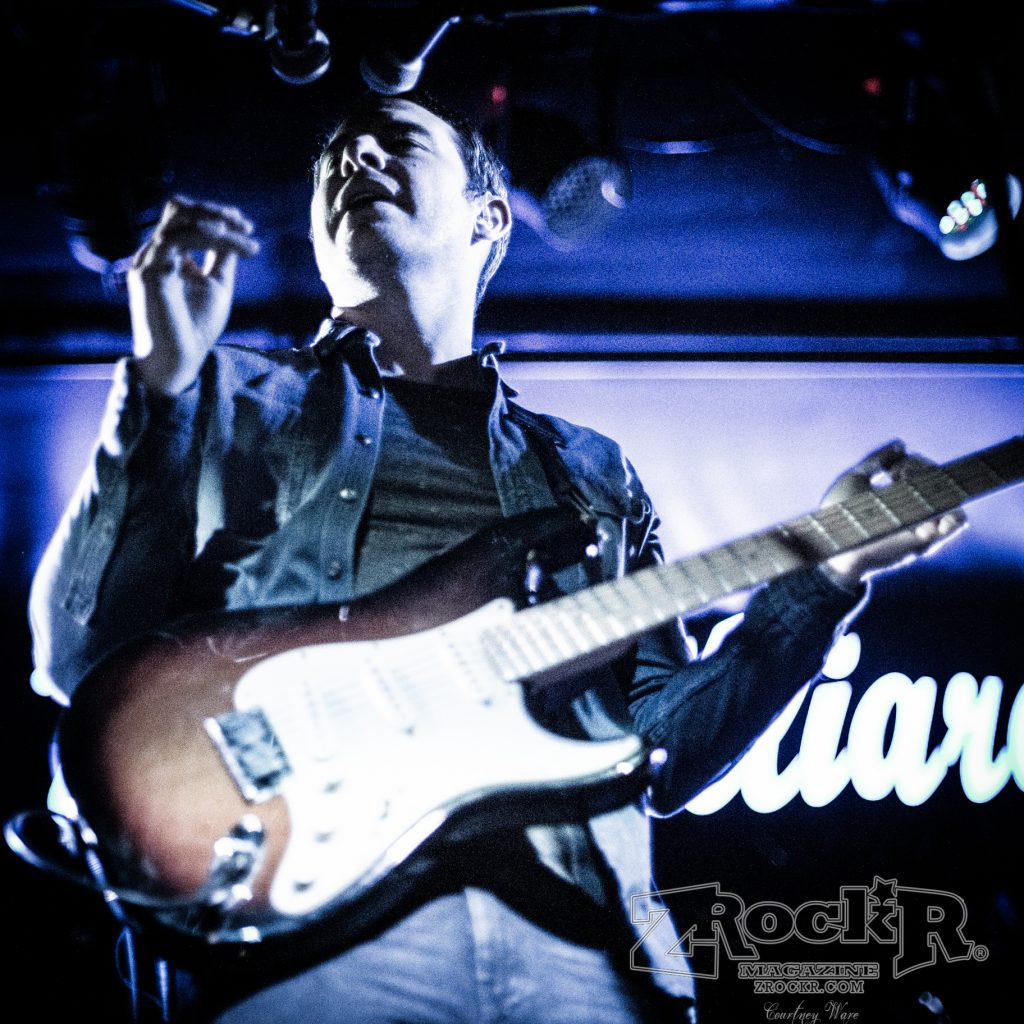
I’m not sure if I did it wrong, but it only lasted for the first song on my phone. Regardless, it was a very amazing light show. The site works with their new album, Multisensory Aesthetic Experience, and I highly suggest checking it out.
Having spoken to the band at this point and understanding what type of experience they were trying to create through sound, I couldn’t help but close my eyes and let the music take over. Songs that I had heard before in my younger years, such as Destination: Beautiful’s “Embers and Envelopes” and The Everglow’s “Someone Else’s Arms” took on a whole new meaning and feeling for me.
The crowd couldn’t get enough, and it reflected on the band’s attitude as well. Dave Elkins had a smile on his face the entire night, and so did the audience.
It wasn’t just the audience’s participation as far as singing along, but actual conversations that happened. Towards the top of Mae’s set, you heard someone yell out, “That was our engagement song!” making every member of the band smile from ear to ear. Later in the set, when Elkins greeted the crowd, you could hear someone say “It’s been too long! We mis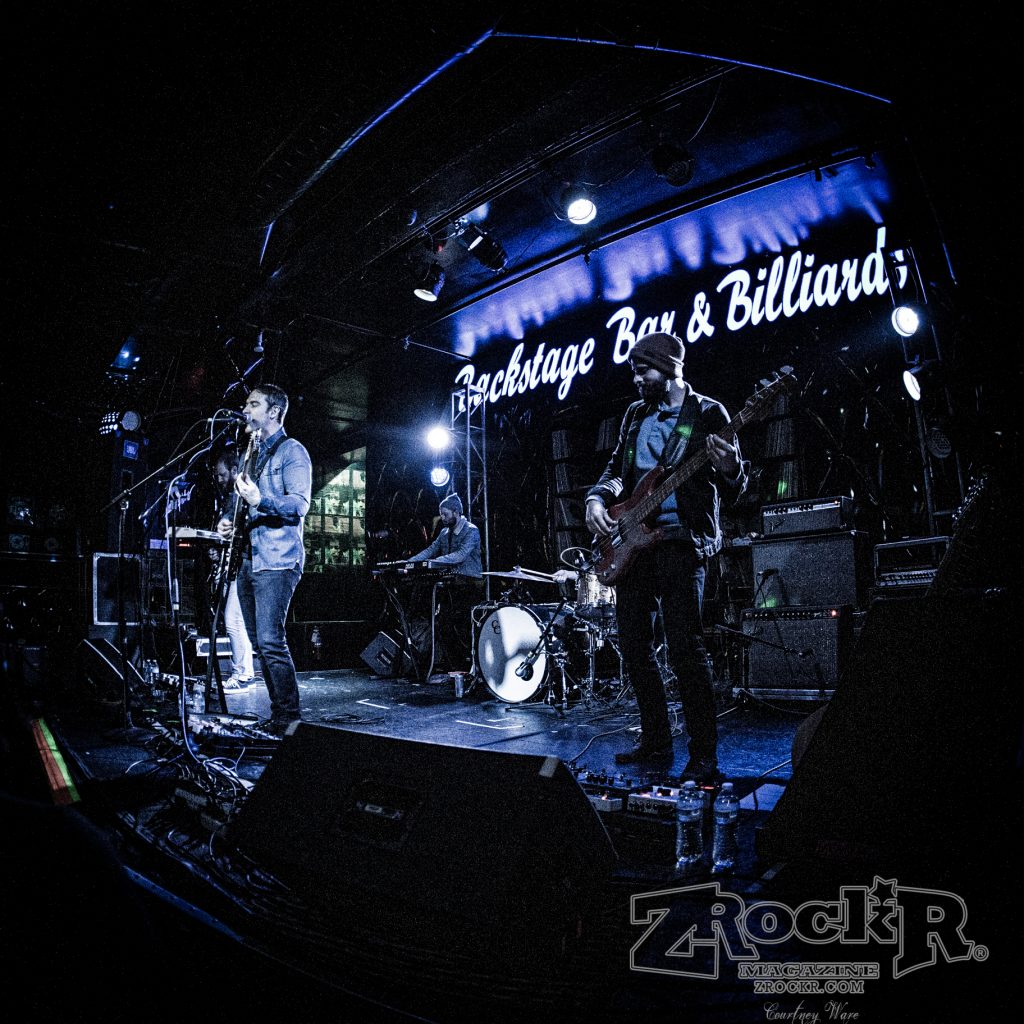 sed you! Visit more often!” and Elkins responded in tandem with them.
sed you! Visit more often!” and Elkins responded in tandem with them.
I think that’s the beauty of smaller sized venues like Triple B’s, is you can have those moments, and in the case of Mae, it definitely made the night a positive one. It didn’t feel like I was at a show. It felt like I was in a room full of friends, checking out another friend’s band and supporting them, and nowadays that is so rare of a feeling.
I look forward to Mae hopefully returning soon, and I definitely plan on being there.
I’d like to just say thank you to the venue for bringing these guys out here, and thank you to Dave Elkins, Zach Gehring, and Jacob Marshall for taking the time to hang out and talk to me.
Mae currently has a few shows coming up! Check them out if they are in your neck of the woods!
March 14 – Honolulu, HI @ The Republik
June 2 – Franklin, TN @ Breakfest 2019
For more information and to keep up with Mae:
Website: https://www.whatismae.com/
Facebook: https://www.facebook.com/mae/
Instagram: https://www.instagram.com/whatismae/
Twitter: https://twitter.com/maeband
PHOTO CREDIT: All photos ©Courtney Ware – ZRockR Magazine

